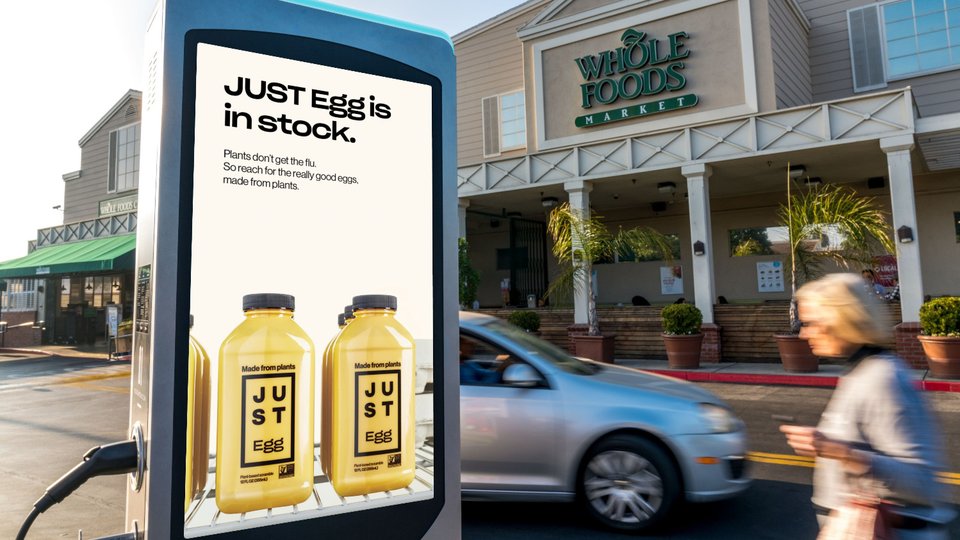DOOH Advertising
Just Eggs cracks open digital strategy, vegan-friendly mission
Digital Signage Today reached out to Tom Rossmeissl, Head of Global Marketing for Eat Just, Inc., via email to learn more about Just Eggs and the company's strategy to leverage the power of DOOH, in collaboration with Volta, to promote its vegan-friendly egg substitute.

February 15, 2023 by Daniel Brown — Editor, Networld Media Group
In the post-COVID world, the global supply chain is still trying to catch up, from technology to meat and eggs; as climate concerns intensify across markets, along with water supply concerns (such as the Colorado River situation in the United States), some companies are turning to plant-based foods as a climate-friendly solution to save energy and resources like water.
And, according to brands like JUST Eggs, the vegan-friendly egg substitute company, they can be healthier and more affordable too. Digital Signage Today reached out to Tom Rossmeissl, Head of Global Marketing for Eat Just Inc., of which Just Eggs is a subsidiary, via email to learn more about Just Eggs and the company's strategy to leverage the power of DOOH, in collaboration with Volta, to promote its vegan-friendly egg substitute.
Q: Tell us more about this "great egg shortage" and how Just Eggs, and plant based generally, fits into that picture.
A:While we're by no means experts on the shelled egg industry, our understanding is that the shortage and increase in prices are due primarily to an avian flu outbreak that has necessitated the culling of tens of millions of egg-laying hens in the U.S. over the past few months. This is another example of the vulnerabilities in our food system and the impact that zoonotic disease can have not only on human health but on our food supply. As we said in our ads, plants don't get the flu, and we can help be a part of the solution.
Q:Can you tell us a bit about Just Egg and what it's trying to accomplish?
A: Just Egg is one of the U.S.'s fastest-growing egg brands, and our products are made entirely from plants. Our protein comes from the mung bean, a 4,000 year old legume that is commonly used in Asian cuisine.
We're on a mission to build a healthier, safer and more sustainable food system. Compared to chicken eggs, Just Egg uses 83% less land, 93% fewer carbon emissions and 98% less water, and to date we have sold the equivalent of more than 350 million chicken eggs. From a health standpoint, Just Egg contains zero cholesterol, 69% less saturated fat and nearly the same amount of protein per serving as a chicken egg.
 |
Image provided. |
Q: In a growing field of plant-based alternatives to meat and other animal-based proteins, what makes Just Egg unique? How many customers are trying the egg-free life?
A: Just Egg is the leading plant-based egg brand, owning more than 99% of the market. And we've helped more than two million households make delicious, plant-based breakfasts. Our product cooks, tastes and functions just like a chicken egg, making it a simple and easy swap for consumers trying to eat more plant-based.
Q: Just how does Just Egg stack up next to eggs in terms of nutrition, cost, flavor, texture, and sustainability?
A:Just Egg contains zero cholesterol, 69% less saturated fat and nearly the same amount of protein per serving as a chicken egg. We are constantly working to improve our product in terms of taste, texture, functionality, and price, with our ultimate goal being to offer a product that tastes better and costs less than chicken eggs. Since we first launched in the US in 2019, we have introduced multiple new formulations of Just Egg to the market with each iteration representing a leap forward in taste, texture and functionality. You can use JUST Egg in many of the same ways you'd use conventional eggs: in a scramble, omelete, frittata, french toast, pancakes and many common baking applications. We offer a variety of recipes on our website for inspiration.
Just Egg's unit velocity in retail is higher than it has ever been, and our prices have remained stable over the past 13 four-week periods, averaging a little more than $4/bottle). Contrast that with empty shelves where chicken eggs are usually found, and the latest Consumer Price Index data (1/12/23) that shows egg prices have risen 11.1% on average in the U.S.
Q: We've heard a lot about crises ranging from energy to protein sourcing amid global population rise, meat contamination, water shortages and drying aquifers, supply chain and shortage problems related to meat and rising costs of traditional meat-based proteins. How exactly do substitutes like JUST Egg aim to change the equation for consumers, and beyond ethical and emotional arguments, what are some of the benefits of switching to these substitutes (even part-time?)
A: Approximately 1/3 of our planet's ice-free land is used to grow feed for animals, and the water usage and carbon emissions produced by animal agriculture is similarly staggering. While beef gets a lot of attention, eggs are the most ubiquitous form of protein eaten by people across the world, so switching some of that consumption from animal to plant-based sources can have a huge impact.
To date, Just Egg has sold more than 350 million egg equivalents saving 61M kg CO2e, 12.8 billion liters of water, and 18,823 acres of land.
Q: You opted for a sustainability-focused company in Volta Media Network to spread the word via DOOH. Was this a conscious decision related to their EV focus? Has the arrangement benefited your mission?
A: We're proud to advertise on a platform that's supporting a more sustainable form of transportation. EV drivers tend to be people who care more about sustainability, and we know plant-based eaters care about both health and sustainability. Most importantly, the platform allowed us to target at the store level, reaching not just EV drivers but all consumers walking between the parking lot and the store entrance. The campaign generated 9M impressions across 820 charging stations.
Q: You also opted for a more traditional route with an ad in the NYT Sunday edition. What fuels this hybrid approach, and what did you learn from trying it?
A: New York Times readers are a great fit for our target "flexitarian" consumer. They tend to be urban, physically active and more likely to buy plant-based foods. We know that an ad in The Times can make a big impact: it's the most prominent paper in the country and thus can help us build buzz, generate conversation and ensure that Just Egg is a part of the conversation around avian flu and the resulting egg shortages and price increases.
 |
The hybrid advertising approach included this ad in the New York Times. Image provided. |
Q: Do you have some advice you would share with other businesses trying to make their mark in this dynamic field, including challenges like ROI in pDOOH?
A:We're not just building a brand. We're building a new category. We're confronting an understandable consumer belief: that an egg must come from a chicken. As we take this on, we spend a lot of time and resources measuring and refining our digital, shopper and performance channel metrics as we move core plant-based consumers down the funnel to purchase. But we have to stay disciplined about the long game: building a brand for both our target consumers now and our consumers of the future. The transition towards plant-based eating will take time, and building a lasting brand, rooted in our values around human and planet health, is what will get us there.
Q: How big is plant-based, and do you see a future where food is overwhelmingly plant-based, not only due to shifting public attitudes, but also questions of affordability, quality, flavor and sheer practicality?
A:The way we produce food now isn't great for the health of our families, animals or the planet. And it's not efficient. One third our planet's ice-free land is used to grow feed — not for people — but for animals. And we're not getting enough out of it. Take beef production: it takes 25 calories in to get one calorie of beef out. The ratio improves somewhat from beef to pork to chicken to eggs, but all of these animal proteins are inefficient. Put simply, we need to use more of our farms and our land to grow food for people, not animals.
We're at just the beginning in how companies like ours will accomplish that. Our ultimate goal is to offer a product that tastes better and costs less than chicken eggs, while being healthier and more sustainable.
(Some existing reports on plant-based market size and projected growth from Food Dive and Bloomberg help illustrate the data behind this overview.)
Q: On a more personal level, what led you to this role in promoting a plant-based product, and how do you feel the effort is going?
A: Like most people in my generation, I am deeply concerned about the fate of our planet. Food systems account for over one-third of global greenhouse emissions. I want to be a part of the solution.
 |
Image provided. |
About Daniel Brown
Daniel Brown is the editor of Digital Signage Today, a contributing editor for Automation & Self-Service, and an accomplished writer and multimedia content producer with extensive experience covering technology and business. His work has appeared in a range of business and technology publications, including interviews with eminent business leaders, inventors and technologists. He has written extensively on AI and the integration of technology and business strategy with empathy and the human touch. Brown is the author of two novels and a podcaster. His previous experience includes IT work at an Ivy League research institution, education and business consulting, and retail sales and management.
 ChatGPT
ChatGPT Grok
Grok Perplexity
Perplexity Claude
Claude







